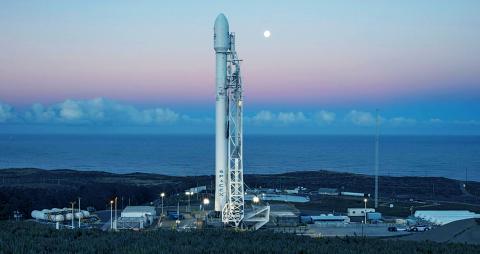The nation’s first domestically designed satellite, Formosat-5, is to be launched on Aug. 25 in the US to resume the observation missions of the decommissioned Formosat-2, the Cabinet said yesterday.
The satellite would collect data for natural disaster evaluation, national security, environmental monitoring, international rescue operations and scientific research, National Space Organization (NSPO) Director Chang Guey-shin (張桂祥) said.
Formosat-2 was decommissioned in August last year after being used in 343 disaster response missions such as providing authorities with immediate images of damaged areas during the Tohoku earthquake and tsunami in Japan in 2011, Chang said.

Photo courtesy of the Ministry of Science and Technology
The 450kg Formosat-5 is the first project in which the NSPO was fully responsible for all engineering, including payload, imaging sensors and ground control systems.
Formosat-5 is to carry the first locally made optical remote sensing instrument equipped with the world’s first space-grade metal oxide semiconductor image sensor, which the organization developed in cooperation with the nation’s electronics and semiconductor industries.
The satellite cost about NT$5.65 billion (US$186 million) to make and is to embark on a five-year observation mission around the globe.
The satellite’s launch was initially scheduled for October last year. A failed rocket test in September last year at SpaceX, the US company commissioned to launch Formosat-5, delayed the launches for all its customers, among which was the NSPO.
SpaceX is contractually required to pay 1.25 percent of the contract amount — about NT$700 million — for every month’s delay, Chang said, adding that the company is expected to pay 10 percent in compensation.
The Formosat-7 program, a follow-up Earth observation mission in which Taiwan is cooperating with the US National Oceanic and Atmospheric Administration, is to launch a constellation of 12 mission-specific satellites plus one NSPO-built satellite to perform radio occultation studies of the upper atmosphere, the NSPO said.
The first constellation of the Formosat-7 program, consisting of six satellites, is expected to be launched next year, the office said.

Alain Robert, known as the "French Spider-Man," praised Alex Honnold as exceptionally well-prepared after the US climber completed a free solo ascent of Taipei 101 yesterday. Robert said Honnold's ascent of the 508m-tall skyscraper in just more than one-and-a-half hours without using safety ropes or equipment was a remarkable achievement. "This is my life," he said in an interview conducted in French, adding that he liked the feeling of being "on the edge of danger." The 63-year-old Frenchman climbed Taipei 101 using ropes in December 2004, taking about four hours to reach the top. On a one-to-10 scale of difficulty, Robert said Taipei 101

Taiwanese and US defense groups are collaborating to introduce deployable, semi-autonomous manufacturing systems for drones and components in a boost to the nation’s supply chain resilience. Taiwan’s G-Tech Optroelectronics Corp subsidiary GTOC and the US’ Aerkomm Inc on Friday announced an agreement with fellow US-based Firestorm Lab to adopt the latter’s xCell, a technology featuring 3D printers fitted in 6.1m container units. The systems enable aerial platforms and parts to be produced in high volumes from dispersed nodes capable of rapid redeployment, to minimize the risk of enemy strikes and to meet field requirements, they said. Firestorm chief technology officer Ian Muceus said

MORE FALL: An investigation into one of Xi’s key cronies, part of a broader ‘anti-corruption’ drive, indicates that he might have a deep distrust in the military, an expert said China’s latest military purge underscores systemic risks in its shift from collective leadership to sole rule under Chinese President Xi Jinping (習近平), and could disrupt its chain of command and military capabilities, a national security official said yesterday. If decisionmaking within the Chinese Communist Party has become “irrational” under one-man rule, the Taiwan Strait and the regional situation must be approached with extreme caution, given unforeseen risks, they added. The anonymous official made the remarks as China’s Central Military Commission Vice Chairman Zhang Youxia (張又俠) and Joint Staff Department Chief of Staff Liu Zhenli (劉振立) were reportedly being investigated for suspected “serious

American climber Alex Honnold is to attempt a free climb of Taipei 101 today at 9am, with traffic closures around the skyscraper. To accommodate the climb attempt and filming, the Taipei Department of Transportation said traffic controls would be enforced around the Taipei 101 area. If weather conditions delay the climb, the restrictions would be pushed back to tomorrow. Traffic controls would be in place today from 7am to 11am around the Taipei 101 area, the department said. Songzhi Road would be fully closed in both directions between Songlian Road and Xinyi Road Sec 5, it said, adding that bidirectional traffic controls would